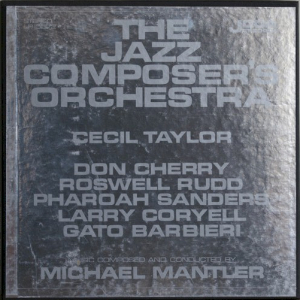Communications (jazz album)
| The Jazz Composer's Orchestra | ||||
|---|---|---|---|---|
 |
||||
| Studio album by Jazz Composer's Orchestra | ||||
| Released | 1968 | |||
| Recorded | January–July, 1968 | |||
| Genre | Free jazz | |||
| Length | 73:40 | |||
| Label | JCOA | |||
| Producer | Michael Mantler | |||
| Jazz Composer's Orchestra chronology | ||||
|
||||
| Professional ratings | |
|---|---|
| Review scores | |
| Source | Rating |
| Allmusic | |
| The Rolling Stone Jazz Record Guide | |
The Jazz Composer's Orchestra is a 1968 double album from the Jazz Composer's Orchestra recorded over a period of six months with Michael Mantler as composer, leader and producer. Many of the key figures in avant-garde jazz from the time contributed on the album including Don Cherry, Pharoah Sanders, Gato Barbieri, Larry Coryell, Roswell Rudd and Carla Bley. The album's finale features a two-part concerto for Cecil Taylor and orchestra.
Mantler "updated" the album in 2014 as "The Jazz Composer's Orchestra Update" on ECM Records. It features the Nouvelle Cuisine Big Band, a new orchestra with parallel orchestra instrumentation conducted by Christoph Cech, and new soloists: Michael Mantler (trumpet), Bjarne Roupé (guitar), Wolfgang Puschnig (alto saxophone), Harry Sokal (tenor saxophone), David Helbock (piano), and the radio.string.quartet.vienna.
Langdon Winner's Rolling Stone review stated "This is a record which all rock musicians as well as general audiences should listen to with care. The first JCOA album is a summit meeting on the Mount Olympus of contemporary jazz which deserves wide attention... By any standard of musical excellence it is a masterpiece." Brian Olewnick of Allmusic stated: "The breadth of this piece, its expansiveness, and its tension between order and chaos is one of the single high-water marks of avant-garde jazz. Communications is a masterwork in and of itself and laid the basis for stunning work by others in decades hence, notably Barry Guy and his London Jazz Composer's Orchestra. It's an essential document for anyone interested in avant jazz and late-20th century creative music"
...
Wikipedia
